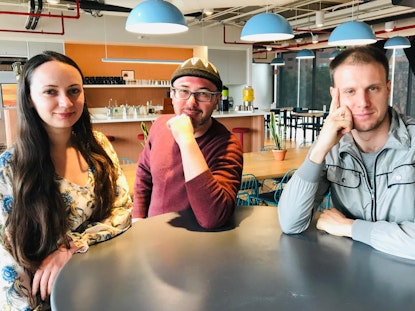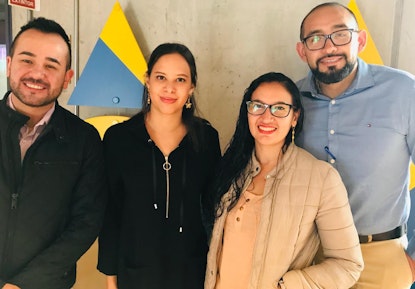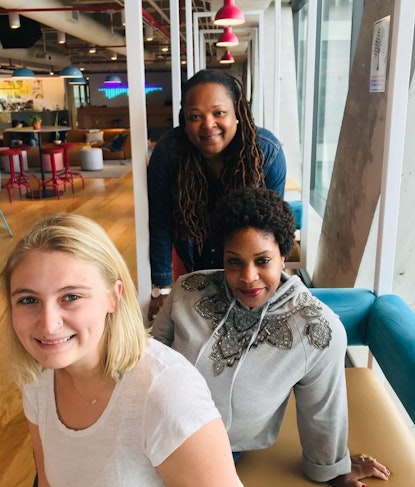How Open Contracting Lift projects are reforming public procurement
This page provides an overview of the alumni teams’ reform plans and the progress achieved thus far, as well as our overarching Lift program targets. Read about our new 2021 cohort here.
These project narratives also integrate adjustments and pivots that the teams made in light of the COVID-19 crisis.
Updated August 27, 2021
Program MEL
| Objective | Target by June 2021 | Current status (May 2021) | Notes |
| Program objective: Create measurable impact and progress from open contracting for better public services, goods, works or economic opportunities | |||
| 1. Create measurable impact and progress | |||
| Impact stories | 1 | on track | Documented cases of measurably improved public works, goods, services or increased economic opportunities from open contracting reforms |
| Progress stories | 2 | 2 achieved: Moldova, Ecuador | Documented instances of achieved open contracting milestones, such as changes in policies or practices |
| 2. Develop in-country capacity for open contracting | |||
| Lift teams perception of usefulness of program support | monitored | Post LiftOff II survey found that almost 9 out of 10 participants felt “more capable to reach my reform goals based on my work with Lift”
Post 100 days workshop survey found that participants rated the workshop a 9 on a scale of 1 to 10, with 1 being ‘I am not satisfied and the workshop was not useful’ and 10 being ‘I am completely satisfied and the workshop was useful.’ 2 out of 5 Lift teams reapplied for the program All teams continue to participate in, at a minimum, biweekly calls with OCP staff |
|
| 3. Develop guidance for the field | |||
| Engagement levels with resources | monitored | Q1 2021
Lift home: 798 (54 in Spanish) Lift application website: 4,990 Blog: Level up your lift project plan: 141 |
|
| New guidance produced | monitored | 30 new unique resources | |
| Community events organized | monitored | 16 (8 english, 8 spanish) | Lift Learning Circles |
City of Buenos Aires, Argentina
Vision
Revitalize local economic development and boost social equity by using open contracting to expand access to procurement opportunities for SMEs.
Challenge
Buenos Aires is home to nearly a quarter of Argentina’s smaller businesses. However, many SMEs in Buenos Aires do not submit applications for public tenders, and these businesses have been particularly hard-hit by the economic crisis caused by COVID-19.
Project
A cross-departmental coalition with key stakeholders across city hall is implementing strategies to strengthen SME participation in the city’s procurement process. The city will analyze barriers facing local businesses to increase vendor registration and SME certification and develop strategies to overcome those obstacles, including improving vendor communications, streamlining processes, and carrying out capacity building strategies to improve the quality of bids. These strategies will be integrated into the larger work undertaken by the Office of Economic Development to assist SMEs in the post-COVID recovery process.
Progress
- Established a cross-departmental working group to secure buy-in across city hall, identify priority reforms and track the progress of their implementation.
- Used data analysis of past procurement processes to identify the types of goods and services purchased by the City that could benefit from greater SME participation.
- Launched a vendor’s portal for COVID-19 emergency procurement. The portal allows businesses to share their ability to provide goods and services to combat the emergency.
- Established legal anti-corruption strategies for emergency procurement, including a signed conflict of interest disclosure form
- Gained deeper understanding of the barriers that SMEs face to participation through developing and issuing a questionnaire and analyzing the results.
- Strengthened the City’s vendor registry through an outreach campaign that allows vendors to be easily identified with a “SME seal” and a “Women-owned enterprise seal.”
Next Steps
- Document insights into how SMEs experience the procurement process and areas for improvement based on user research.
- Design and complete training series for SMEs on public tenders to increase their capacities to submit high-quality and competitive bids.
- Track vendor registration and participation in public procurement processes associated with the new strategies.
Positive Initiative, Moldova
Vision
Improve Moldovans’ access to quality healthcare and treatments by lowering the price of essential medicines, including HIV and tuberculosis medicines, and improving the transparency, efficacy, and accountability of the medical procurement process.
Challenge
Moldova has some of the highest rates of HIV and tuberculosis in Europe, but the medicines used to treat these conditions are often very expensive or not available. During the COVID-19 crisis, the country also faced skyrocketing costs for emergency medical supplies and a lack of public oversight over emergency tenders.
Project
The civil society group Positive Initiative is working with the government’s center for health procurement to reach their goal of lowering the prices for essential medication by establishing an oversight system for medical procurement purchases, strengthening the procurement institutions, and developing a strong, nation-wide Stock Management System (SMS) for all hospitals, as well as identifying which generic medicines could be substituted for the medicines that are currently purchased and changing policies to allow these generic medicines to be used by practitioners.
Progress
- Secured lower prices for HIV and Hepatitis medicines and increased competition for these contracts.
- Signed cooperation agreements to improve healthcare by the Ministry of Health and other health authorities.
- Identified the name-brand drugs currently procured which could be replaced by lower-cost generics.
- Successfully advocated for healthcare procurement regulation adjustment in order to improve and tighten the contracting process.
- Secured initial funding and established working group to develop a country-wide stock management system that considers stakeholder needs.
- Built a public platform about all the government’s contracts for supplies and services to fight COVID-19.
- Successfully advocated for CAPCS to open medical procurement information through the national open data portal MTender.
Next Steps
- Conduct training with civil society representatives on monitoring, evaluation and learning skills; using data-driven approach in procurement monitoring; medicines delivery monitoring etc.
- Build a centralized stock management system in consultation with the working group.
- Advance their research on generic replacements for brand-name drugs.
- Secure lower prices for Tuberculosis medicines using lessons learned from success with HIV and Hepatitis.
City of Mexico, Mexico
Vision
A revamped public bike share program that enables more city residents to access an affordable, environmentally friendly, and convenient mode of transportation. The procurement process will also serve as a pilot to demonstrate the benefits of open contracting for the public and city officials, with aim of scaling up this approach throughout city hall.
Challenge
Mexico City’s bike share program is one of the largest of its kind in Latin America, but some neighborhoods are still left out. Now that the ECOBICI contract is up for renewal after a decade, the city wants to use this as an opportunity to revamp the system and tailor it to the needs of the 321,000 bike riders who use the service, and expand it to underserved communities and build better connections to the city’s public transportation system. This effort is more important than ever as residents are turning to the bikeshare system as a safer form of transportation in the era of COVID-19.
Project
Mexico City seeks to renew the contract using an open and competitive process that guarantees the best conditions of public service, value for money, and transparency. To this end, the team is engaging the vendors and the public throughout the procurement process through market consultations, user research, and strategic communications. The team also intends to use this project to promote open contracting within city hall by replicating similar strategies and lessons learned to other procurement processes.
Progress
- Carried out a public communications campaign informing vendors and the public about the expansion and renewal of the bike share system, setting the stage for a more transparent, open, and competitive procurement process.
- Launched a dedicated public-facing microsite with user-friendly information about the procurement process and key aggregated findings from vendors.
- Issued the city’s first-ever Request for Information to understand the market and supplier capabilities, as well as follow up survey to measure the impact of the pandemic in the market. After directly awarding the contract to the same vendor for over a decade, the City received a total of 17 combined responses from more than a dozen companies, showing a robust interest from the vendor community in Ecobici.
- Published a draft of the Terms of Reference, receiving and incorporating hundreds of comments and suggestions from vendors and the public to the final tender documents.
- Other departments within the City government have replicated the team’s open contracting strategies around vendor engagement. Two new processes to renew the City’s bus fleet and security cameras have issued Requests for Information.
- Secured agreement to expand the Ecobici system to connect more residents to transit hubs within the city.
Next Steps
- Finalize Request for Proposals based on market research and City priorities.
- Award and launch the new bike-share system with expanded service areas.
- Develop an environmentally-friendly plan for reusing current Ecobici bicycles through a public consultation with residents on the city’s microsite.
- Develop new modules for the City’s e-procurement system Tianguis Digital to improve citizen and vendor engagement in key procurement processes.
The National Public Procurement Service of Ecuador (SERCOP) in partnership with Fundación Ciudadanía y Desarrollo, Ecuador
Vision
Create a more open, transparent, and responsive public procurement ecosystem in Ecuador.
Challenge
Ecuador’s public procurement system suffers from lack of transparency and limited competition, generating numerous integrity risks and leading to poor service delivery in core government services.
Project
To achieve a more open and transparent ecosystem, the team will create a civic public procurement monitoring system with an initial focus on emergency procurement and a second stage focused more broadly on competitive procurement methods. In addition, the team will develop a platform to publish all public procurement information as structured open data in the Open Contracting Data Standard. Together, this will support a healthy feedback loop between civil society and the government that fights corruption and promotes better services for Ecuadorians.
Progress
- Created a public search tool to monitor COVID-19 emergency procurement and detect signs of corruption and provided a channel for complaints; this has allowed civil society to detect corruption and generate public pressure for change, leading to suspending processes and holding actors accountable.
- Created an Emergency Open Data Portal with key visualizations and data in OCDS format regarding COVID-19 procurement.
- Launched the anti-corruption public procurement observatory, producing multiple research reports with policy recommendations on how to improve data quality.
- Initiated OCDS publication on a user-friendly open contracting portal with a Web API and dashboards for key stakeholders, including agencies and suppliers. The publication will prioritize competitive procurement methods and then expand to cover all procurement processes.
Next Steps
- The public procurement observatory to issue continue recommendations on how to improve procurements, such as medicine procurement, based on data and expert analysis.
- Develop and launch a capacity building program to train local governments, the private sector, and civil society organizations including journalists in public procurement and open contracting best practices.
- Document a reduction in the amount of contracts directly awarded to vendors as a result of the team’s efforts to drive systemic change.
City of New Orleans, United States
Vision
Build a more equitable and inclusive city by using open contracting to expand access to procurement opportunities for local, women- and minority-owned small businesses.
Challenge
Local women- and minority-owned businesses are underrepresented in the government procurement market of New Orleans. These businesses are also the most vulnerable to the economic fallout from the COVID-19 crisis.
Project
The city aims to award more contracts to these firms by making procurement data more user-friendly, changing policies to increase contract accessibility, and updating how the city conducts outreach to the local vendor community to encourage greater participation.
Progress
- Achieved internal alignment with key stakeholders on project plan, areas for improvement, and next steps, through high-level joint planning meetings.
- Increased understanding of DBE barriers to participation through analyzing the results of a targeted questionnaire.
- Increased staff capacity to understand and navigate the city procurement process through develop and conducting a new training program for staff across city departments.
- Issued recommendations to improve usability of the city’s supplier portal, BRASS, based on user testing with DBEs in collaboration with the What Works Cities program.
Next Steps
- Improve vendor capacity through developing and implementing a training program for vendors, including topics such as registration and payment.
- Updating main web page to improve usability for vendors and make it easier to access key information.
- Improve the city’s ability to access and analyze data on spending with DBEs by aligning BRASS with the city’s B2G portal.
- Update policies and procedures, including reduce late payment issues for vendors by improving the quality of purchase orders and unbundling contracts to make them more accessible to smaller vendors.


